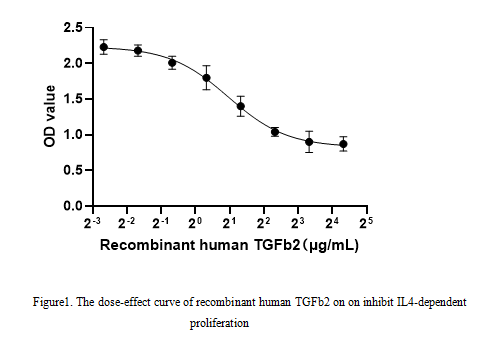Active Transforming Growth Factor Beta 2 (TGFb2)
TGF-B2; TGF-Beta2; G-TSF; LAP; Cetermin; Polyergin; Latency-associated peptide; BSC-1 cell growth inhibitor; Glioblastoma-derived T-cell suppressor factor
- Product No.UAPA218Hu01
- Organism SpeciesHomo sapiens (Human) Same name, Different species.
- Buffer FormulationPBS, pH7.4, containing 0.01% SKL, 5% Trehalose.
- TraitsFreeze-dried powder
- Purity> 90%
- Isoelectric Point8.9
- ApplicationsCell culture; Activity Assays.
- Download Instruction Manual
- UOM 10µg50µg 200µg 1mg 5mg
-
FOB
US$ 165
For more details, please contact local distributors!US$ 412
For more details, please contact local distributors! US$ 824
For more details, please contact local distributors! US$ 2472
For more details, please contact local distributors! US$ 6180
For more details, please contact local distributors!
ACTIVITY TEST of the Active Transforming Growth Factor Beta 2 (TGFb2)


Transforming Growth Factor Beta 2 (TGFB2) belongs to TGF-beta family. As a secreted protein and a cytokine, TGFB2 plays a role in the formation of blood vessels, the regulation of muscle tissue and body fat development, wound healing, and immune system function. Besides, TGFB2 regulates cell proliferation, differentiation, adhesion, migration by transducing the signal through transmembrane receptors type I and type II (TGFBR1 and TGFBR2). To test the effect of TGFb2 on inhibit IL4-dependent proliferation, CTLL-2 cells were seeded into triplicate wells of 96-well plates, the medium was 2% serum RPMI-1640 including various concentrations of recombinant human TGFb2. After incubated for 72h, cells were observed by inverted microscope and cell proliferation was measured by Cell Counting Kit-8 (CCK-8). Briefly, 10 µl of CCK-8 solution was added to each well of the plate, then the absorbance at 450 nm was measured. Cell viability was assessed by CCK-8 assay. The result was shown in Figure1. It was obvious that TGFB2 significantly decreased cell viability of CTLL-2 cells. The ED50 of recombinant human TGFB2 is 1.95μg/mL.
USAGE of the Active Transforming Growth Factor Beta 2 (TGFb2)
Reconstitute in 10mM PBS (pH7.4) to a concentration of 0.1-1.0 mg/mL. Do not vortex.
STORAGE of the Active Transforming Growth Factor Beta 2 (TGFb2)
Avoid repeated freeze/thaw cycles. Store at 2-8°C for one month. Aliquot and store at -80°C for 12 months.
STABILITY of the Active Transforming Growth Factor Beta 2 (TGFb2)
The thermal stability is described by the loss rate. The loss rate was determined by accelerated thermal degradation test, that is, incubate the protein at 37°C for 48h, and no obvious degradation and precipitation were observed. The loss rate is less than 5% within the expiration date under appropriate storage condition.
INCREMENT SERVICES
BCA Protein Quantification Kit
Molecular Mass Marker for Protein
Monoclonal Antibody Customized Service
Polyclonal Antibody Customized Service
Protein Activity Test Experiment Service
Electrophoretic Mobility Shift Assay (EMSA) Experiment Service
Buffer
Lentivirus Packaging Experiment Service
Adenovirus Packaging Experiment Service
Real Time PCR Experimental Service
Spike RBD Protein (S-RBD)
Protein G
Protein A



